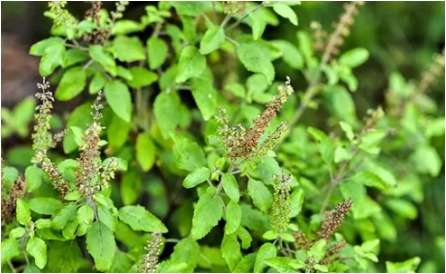
Ayurveda has long recognized the potential of herbs as panaceas for various diseases, and one such revered herb is Tulsi, also known as Holy Basil.
Tulsi holds a significant place in Ayurvedic medicine and offers a wide range of health benefits:
- Immune System Booster: Tulsi leaves are rich in antioxidants and possess immunomodulatory properties, which help strengthen the immune system, making the body more resilient against infections and diseases.
- Antibacterial, Anti-inflammatory, and Antifungal Properties: Tulsi leaves contain essential oils and bioactive compounds that exhibit antibacterial, anti-inflammatory, and antifungal properties. This makes Tulsi an effective remedy for various skin problems, promoting skin health and overall well-being.
- Respiratory Health: Tulsi is known for its effectiveness in promoting respiratory health. Its antimicrobial and anti-inflammatory properties can help alleviate symptoms of respiratory conditions like cough, cold, and asthma.
- Stress Relief: Tulsi is considered an adaptogenic herb, which means it helps the body adapt to stress and promotes overall relaxation. Consuming Tulsi tea or decoction can have calming effects on the nervous system.
- Digestive Support: Tulsi is beneficial for digestive health, as it aids in digestion, reduces gas and bloating, and helps in maintaining a healthy gut.
Tulsi is versatile and can be used in various forms, such as consuming Tulsi leaves in tea or decoction, adding them to meals, or using Tulsi extracts in skincare products.
As with any herbal remedy, individual responses to Tulsi may vary, and it is essential to exercise caution and consult with a healthcare professional before using Tulsi for medicinal purposes, especially if you have underlying health conditions or are taking medications.
Incorporating Ayurvedic wisdom and domestic herbs like Tulsi into your lifestyle can be beneficial for supporting overall health and promoting wellness. Embracing a holistic approach to health that considers both traditional knowledge and modern medical practices can lead to a more comprehensive and balanced well-being.
